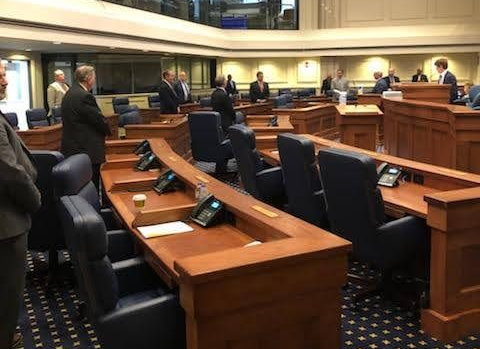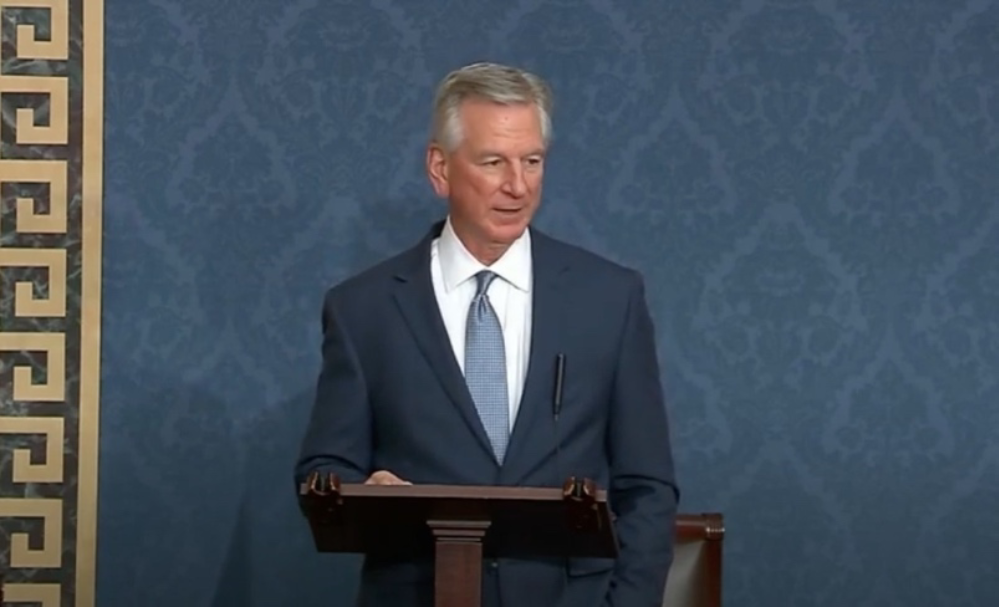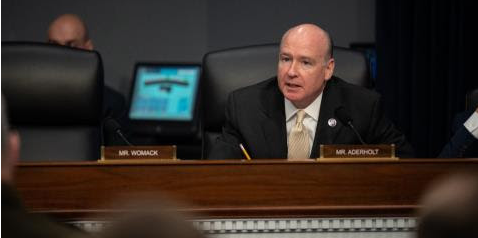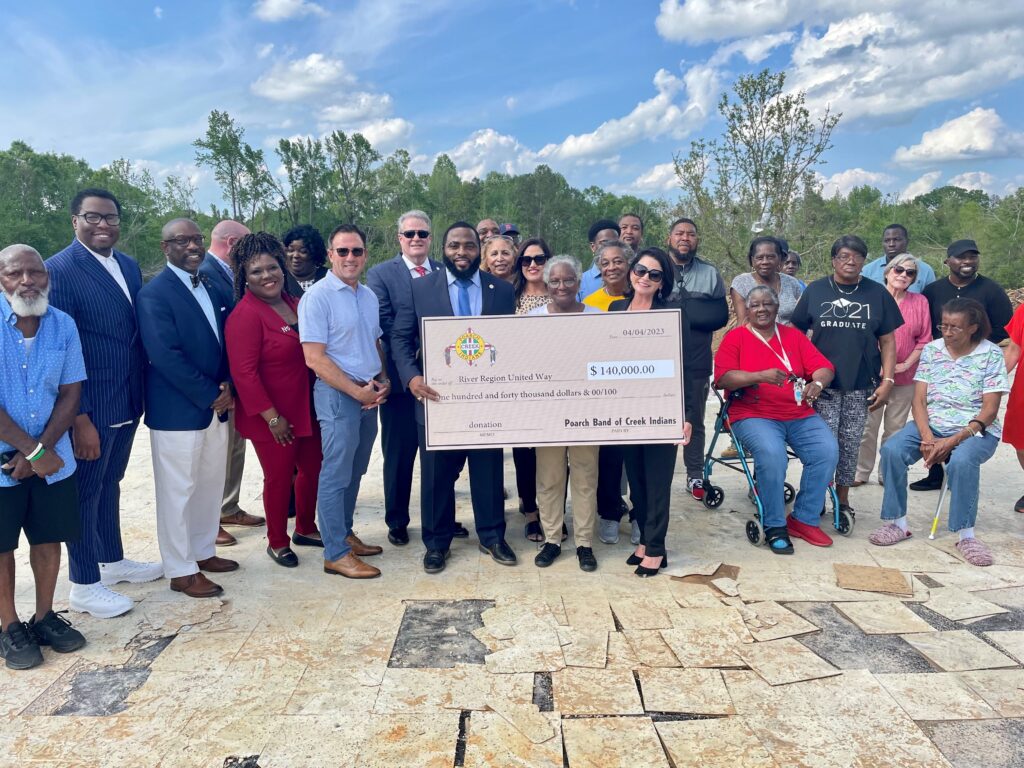Senate passes bill doubling the size of purchases that do not have to be competitively bid

On Thursday, the Alabama Senate passed legislation that would double the size of government purchases that are not subject to the competitive bid process. The current cap is $15,000. This legislation would raise that to $30,000 and then raise it annually as the consumer price index increases. Senate Bill 108 (SB108) is sponsored by State Senator Linda Coleman-Madison. Sen. Coleman-Madison explained that under current Alabama public contract law, government entities have to submit any purchase of $15,000 and over to the public bid process. The current bid law was set years ago, and inflation has caused everything to go up. This raises it to $30,000 and ties the amount “to the consumer price index so they don’t have to come back.” “This is subject to review every three years,” explained Sen. Coleman-Madison. According to the synopsis, “Under existing law, with the exception of contracts for public works, all expenditure of funds of whatever nature for labor, services, work, or for the purchase or lease of materials, equipment, supplies, or other personal property involving $15,000 or more made by or on behalf of certain state and local public awarding authorities are required to be made by contractual agreement entered into by free and open competitive bidding, on sealed bids, to the lowest responsible bidder. This bill would increase various threshold dollar amounts for which competitive bidding is generally required and would authorize those dollar amounts to be further increased based on increases in the Consumer Price Index.” Advocates for competitive bids argue that insiders get government sales and contracts without competitive bids, while persons outside of the political “good ole boy” networks are left out, and that competitive bidding saves taxpayer dollars. SB108 passed the Senate 31 to 0. The bill now goes to the Alabama House of Representatives for their consideration. SB108 has been referred to the House State Government Committee. Tuesday will be day 8 of the 2023 Alabama Regular Legislative Session. The House of Representatives will convene at 1:00 p.m. The Senate will convene at 3:00 p.m. Both sessions can be viewed online at the legislature’s website. The legislature is limited to thirty legislative days in a regular session. To connect with the author of this story or to comment, email brandonmreporter@gmail.com.
Tommy Tuberville opposes Biden Administration’s effort to allow biological males to compete in women’s sports

U.S. Senator Tommy Tuberville on Tuesday released a statement condemning the Biden administration’s new Title IX proposed rule that coerces schools to allow biological males to compete in women’s sports. “For more than 50 years, Title IX has been a historic success for women and girls in this country,” said Sen. Tuberville. “As a coach, educator, and mentor, I’ve seen its success firsthand. The Biden administration’s policies have already taken a sledgehammer to Title IX, and this proposed rule is another example of Joe Biden doing the bidding of the radical left. This new rule is a disservice to every girl in this country who dreams of becoming a student-athlete. I urge the Biden administration to listen to parents, teachers, and coaches and not to follow through with these misguided policies. Our colleagues in Congress will have to consider every option available to nullify this harmful new rule, including passing my legislation, the Protection of Women and Girls in Sports Act.” The proposed rule would revise students’ Title IX discrimination protections in athletics to include gender identity. The Biden Administration would defund schools and overrule state policies aimed at supporting women in sports after they are implemented without providing clarity as to what kind of policy, if any, would comply. The Biden administration is simply changing the biological definition of gender without passing legislation through Congress. In March, Senator Tuberville led more than half of the Senate Republican Conference in reintroducing the Protection of Women and Girls in Sports Act. The legislation would preserve Title IX protections for female athletes and ensure fair, safe competition in women’s sports across the country. Senator Tuberville is the ranking member of the Senate Health, Education, Labor, and Pensions (HELP) Subcommittee on Children and Families. His condemnation echoes the rebuke from U.S. Senator Bill Cassidy, the ranking member of the Senate HELP Committee. “This is a fairness issue,” Sen. Cassidy said. “Female athletes who work extremely hard should not have their future in athletics hindered because they are forced to compete against biological males who have an unfair physical advantage. This action by the administration is completely against the spirit of Title IX to promote participation in sports for girls and women.” Last year, on the 50th anniversary of Title IX’s enactment, the U.S. Department of Education issued a proposed rule to allow biological males to compete in women’s sports. Senator Tuberville offered a public comment on the proposed rule, citing his concern about the negative implications it would cause for female athletes. Despite opposition from members of Congress and widespread opposition from women athletes across the country, the department recently decided to finalize the rule. The rule is expected to take effect during the 2023-2024 school year. Tuberville cited his experience as a former educator, mentor, and coach for more than 40 years in his concern about the future of women’s sports. He began his career coaching high school girls’ basketball shortly after the enactment of Title IX and witnessed the law’s positive impacts firsthand. Senator Tuberville has been a vocal advocate of preserving Title IX and urged federal officials to keep the protections in place. The White House maintains that high school and college athletes should be allowed to compete as the gender they identify as rather than their biological gender, claiming that gender is more than genetics. Tuberville was elected to the Senate in 2020. To connect with the author of this story or to comment, email brandonmreporter@gmail.com.
House Committee advances bill to allow mothers to receive birth certificates for a child lost from miscarriage

On Wednesday, the Alabama House Health Committee voted to give a favorable report to legislation allowing mothers whose preborn children were lost due to miscarriage or through a stillbirth to receive a state-issued birth certificate. House Bill 55 (HB55) is sponsored by State Representative Juandalynn Givan. “I have the honor today to present to you HB55, which, if entitled, will be called the Genesis Act,” Givan said. According to the synopsis, “Under existing law, a nonviable birth that occurs before the twentieth week of gestation is not reported to the Office of Vital Statistics, and a parent of a nonviable birth that occurs before the twentieth week of gestation may not request a certificate of birth. Also, under existing law, a parent of a fetal death occurring after 20 weeks of gestation may request a Certificate of Birth Resulting in Stillbirth. This bill would create the Genesis Act to require the Alabama Department of Public Health to adopt rules allowing for the parents of a nonviable birth occurring before the twentieth week of gestation to request a Certificate of Nonviable Birth.” Givan said that she is representing the mothers who have lost children before the twentieth week of gestation and that they want to be able to petition the state for documentation on the loss of that preborn child. “I want someone to know that the life that I carried mattered,” Givan said that the mothers supporting this legislation feel. “I want someone to know that that baby was loved and mattered to me.” “After 20 weeks of gestation, a parent can request a birth certificate from the Health Department,” Givan said, explaining that her bill would extend that to include pregnancies lost between ten weeks and nineteen weeks. Givan said that HB55 would permit the State Department of Health to do so and that the Health Department supports the legislation. “Dr. Scott Harris (the state health officer) shared the story of how his mother went through the same thing when young in life,” Givan said. State Rep. Paul Lee, a Republican from Dothan, chairs the House Health Committee. “Everyone received the amendment last night, and it is in your packet,” Chairman Lee said. The Committee voted to adopt the amendment. Givan explained that the Health Department would issue the nonviable birth certificate within 50 days after the request is made. “Florida was the first state to pass this into law in 2019,” Givan explained. “Other states have followed.” Rep. Phillip Rigsby motioned to give the bill a favorable report. The Committee voted unanimously to give HB55 a favorable report. HB55 could be considered by the full Alabama House of Representatives as early as Tuesday. Givan was joined in the committee hearing by a delegation of mothers whose children had been lost through miscarriage. Givan introduced the mothers to the Committee and thanked the members for the favorable report. As of Monday, 471 bills have been filed in the 2023 Alabama Regular Legislative Session. Tuesday will be day 8 of the regular session. The Alabama Constitution limits the regular session to no more than thirty legislative days during a regular session. To connect with the author of this story or to comment, email brandonmreporter@gmail.com.
Robert Aderholt says Texas court decision on abortion pill is “crucial victory for defending life”

Congressman Robert Aderholt released a statement on Saturday in response to the Northern District of Texas’ ruling in Alliance for Hippocratic Medicine v. U.S. Food and Drug Administration. The Texas Judge ruled that the U.S. Food and Drug Administration improperly approved mifepristone – one of the two most common abortion pills in the United States. “This decision from the Northern District of Texas is a win for protecting women’s health and a crucial victory for defending life,” said Rep. Aderholt. “As long as chemical abortion drugs are available, the lives of women and the unborn are at stake.” The Alliance for Hippocratic Medicine filed a petition against the Food and Drug Administration (FDA)’s actions regarding the chemical abortion drug back in 2002, but the FDA stonewalled judicial review until now. “As a Member of the House Appropriations Committee, the actions of the Food and Drug Administration in misusing its authority and expediting approval of this dangerous drug have been of great concern,” said Aderholt, who Chairs the House Values Action Team. “When this drug was approved over 20 years ago, it relied on flawed and irrelevant studies and failed to adequately study the dangers this drug posed for adolescent girls.” “The Biden administration continues to say that easy abortions are crucial to women’s healthcare, but the FDA pushed abortion pills to market, which have killed mothers and their children,” said Rep. Doug Lamborn, who co-chairs the House Values Action Team. “Yesterday’s ruling in Alliance for Hippocratic Medicine v. FDA brings common sense back to our healthcare process while saving lives. The first rule of the Hippocratic oath is to do no harm, and I am pleased to see numerous recent court decisions upholding this standard for women and babies across the nation.” Aderholt signed an amicus brief asking the court to find in favor of the Alliance for Hippocratic Medicine’s court filing. “I was proud to join 67 Members of Congress in signing on to an amicus brief led by my colleague, Congressman August Pfluger,” added Aderholt. “This amicus identified several key issues, including the failure of the FDA to adhere to the drug approval process in the Federal Food, Drug, and Cosmetic Act (FFDCA); the unlawful waiver of the pediatric study requirement under the Pediatric Research Equity Act; and the violation of federal law by permitting mail-order chemical abortion pills.” “This victory in court brings us one step closer to protecting the sanctity of life and the safety of mothers,” said Rep. Pfluger. “I’m proud to work with other members of Congress, Alliance for Hippocratic Medicine, Americans United for Life, and countless others in being a voice for the voiceless.” The Biden Administration filed a notice of appeal Friday evening. On Monday, the Justice Department filed a 49-page appeal asking for the Fifth Circuit Court of Appeals to hear this decision. The DOJ argued in that filing that the plaintiffs had no standing to file their lawsuit because they were not personally harmed by the abortion pill. The judge’s order goes into effect on Friday unless the order is stayed by the appeals court. The House Values Action Team, led by Rep. Aderholt, will continue to follow this case closely. Aderholt is also the Chairman of the House Labor, Health and Human Services, and Education Appropriations Subcommittee. He is in his 14th term representing Alabama’s Fourth Congressional District. To connect with the author of this story or to comment, email brandonmreporter@gmail.com.
Will Ainsworth: It’s time to teach our students that the difference between happiness and regret is the ability to manage money

Despite rising salaries, a robust economy, and a highly competitive job market that is forcing some employers to entice new workers with signing bonuses, many Alabamians continue to struggle financially and find themselves living from paycheck to paycheck. A national study conducted just last month indicated that 57 percent of those surveyed said they would be unable to cover a $1,000 emergency expense with their savings, and even fewer indicated they could pay their living expenses for a month if they lost their primary income source. The Biden administration’s skyrocketing inflation rate has forced grocery prices to rise by 20 percent over the past two years along with rent increases that average 13 percent shoulders much of the blame, but other factors are at play. During my discussions with business owners across Alabama, several have told me that their employees are “always broke” and do not know how to manage their money effectively. Many workers, according to the employers with whom I spoke, are wholly unfamiliar with the various types of bank accounts that are available, how to manage debt, the importance of having a good credit score, how to plan for taxes, and other basic financial knowledge. My immediate thought upon hearing these concerns was, “If employees are struggling financially when Alabama is experiencing its lowest unemployment, best wages, and greatest economy in history, how are they going to handle it when the inevitable recession finally arrives?” Since becoming lieutenant governor, I have focused much of my efforts on workforce development and ensuring that high school students graduate with the skills necessary to secure a long-lasting, well-paying job and succeed in the workplace. But we must also make sure that they graduate with the basic skills necessary to succeed in life. That is why I am voicing my support for legislation being sponsored by State Rep. Andy Whitt (R – Harvest) that would require all high school students to pass a course focused solely upon financial literacy and money management before securing their diploma. Alabama currently mandates a career preparedness course that touches briefly upon the topic, but Rep. Whitt’s bill recognizes that intensive instruction is needed. As a community banker and vice chair of the House Financial Services Committee, Rep. Whitt is exposed on an almost daily basis to firsthand evidence that more financial literacy education is needed, and he, to his credit, is proposing a plan to fill the vacuum. The bill is being carried in the Senate by Sen. Jay Hovey (R – Auburn), who is employed as a mortgage loan officer at AuburnBank and similarly recognizes the importance of financial literacy in his daily interactions with customers. Each of our surrounding southeastern states already has a financial literacy course requirement in place, and it is time for Alabama to do the same. Under the provisions of Rep. Whitt’s bill, public school students entering ninth grade during the 2024 – 2025 school year would receive instruction on topics like balancing a checkbook, principles of money management, retail and credit card debt, computing interest rates, types of loans and insurance policies, taxation percentages, investment options, and others. The State Department of Education would also be tasked with creating a standardized exam that students would be required to take and pass.If we mandate that students become financially literate early in life, it will ease their way into adulthood and avoid the fiscal pitfalls that have trapped so many individuals before them. All of us know someone who signed up for credit cards while in college or as young adults and went on spending sprees because they considered them “free money” but were plagued for years afterward by ballooning interest rates, minimum payment struggles, and bad credit scores as a result. Financial literacy education can end that burden before it starts. Perhaps some students will begin planning for retirement earlier than usual, others may open savings or investment accounts to protect or grow their money, and even more, will come to understand that often the difference between happiness and regret is the ability to manage money wisely. Financial literacy can also aid in the workplace for those who regularly handle money or conduct transactions as part of their job, and it can put an end to living check to check just to survive and get by. If even a handful of students learn how to manage money responsibility and live less stressful and more successful lives as a result, the course would prove worthwhile, but I am confident that countless students will reap these benefits for many years to come. It is time to for Alabama to help our high school students chart a course toward fiscal freedom and financial independence and prove true the words of founding father Benjamin Franklin, who once said, “An investment in knowledge pays the best interest.” Will Ainsworth has served as lieutenant governor of Alabama since 2019.
Second case of rabies confirmed in Houston County

The Alabama Department of Public Health (ADPH) confirmed on Friday that a fox found on Broadway Avenue in the town of Avon in Houston County has tested positive for rabies. The fox was found in a private yard where the owner was alerted by barking dogs. The owner and dogs have received appropriate medical attention. The fox was taken to the state Bureau of Clinical Laboratories, where rabies was confirmed. This is the second case of laboratory-confirmed rabies in Houston County in 2023. The first case was in February 2023, when a raccoon was found dead in the town of Pansey. The raccoon’s corpse was sent to the state laboratory, where rabies was confirmed. Dr. Dee W. Jones is the State Public Health Veterinarian. “This should be a stern reminder that all pets should be properly vaccinated against rabies, given the circumstances of two rabid animals now in the same general area.” Dr. Jones said. “It is not unusual to see clusters of rabies cases in wild animals and strays during this time of year.” It is very common for domestic animals and pets to have contact with a wild rabid animal. Alabama state law requires that dogs, cats, and ferrets 12 weeks of age and older be current with rabies vaccination. Rabies vaccines are also available for horses and other livestock if recommended by a veterinarian. Vaccinating animals reduces the risk of rabies infection should exposure occur; thus, vaccinations protect animals, as well as their owners and caretakers. Rabies prevention is multifaceted. It involves people taking precautions with wildlife, making sure that their pets are current on rabies vaccinations, and always reporting an animal bite or other exposures to their medical provider and ADPH. In addition to vaccination, area residents are advised to take the following precautions to avoid possible exposures to rabies: * Do not allow pets to run loose; confine them within a fenced-in area or with a leash. * Do not leave uneaten pet food or scraps near your residence. * Do not illegally feed or keep wildlife as pets. * Do not go near wildlife or domestic animals that are acting in a strange or unusual manner. * Caution children not to go near any stray or wild animal, regardless of its behavior. ADPH is working with local veterinarians and the county rabies officer to get animals vaccinated. Dr. Brad Harris, the Houston County rabies officer, will be holding reduced-fee vaccination clinics on Saturday, May 6, from 8-11 a.m. at Westgate Park and Houston County Farm Center. Also, for stray or unwanted animals, contact Houston County Rabies Control at (334) 678-2810. Alabama is home to two different strains of rabies virus: the raccoon variant and the bat variant. The raccoon strain can infect other wildlife, such as foxes, coyotes, and skunks, but more importantly, it can infect people’s pets. The bat variant can be more tricky as bat bites are so small that a bat bite may go unnoticed by pet owners. Houston was among the 20 Alabama Counties to have confirmed rabies cases last year. 24 raccoons, 8 bats, 4 dogs, 6 foxes, 1 cat, 1 bobcat, and 1 coyote were confirmed rabies positive last year. Every year Alabama participates in a federal program that is distributing rabies vaccine to raccoons by air. To connect with the author of this story or to comment, email brandonmreporter@gmail.com.
Senate passes legislation to ban exhibition driving

On Thursday, the Alabama State Senate voted in favor of legislation outlawing street racing and other forms of exhibition driving, such as tire burnouts and doing donuts with a motor vehicle. Senate Bill 58 (SB58) is sponsored by State Sen. Rodger Smitherman. Smitherman is a Democrat from Birmingham. “In our area, we have had four people killed,” from racing Smitherman said. “Currently, all you can do is misdemeanors. Sen. Will Barfoot spoke in support of the legislation. “This really does give law enforcement the option to really clamp down on this,” Sen. Barfoot said. Smitherman said, “My house sponsor is Rep. Treadaway.” Smitherman explained that Rep. Allen Treadaway, the former City of Birmingham Deputy Police Chief, is sponsoring the same legislation in the Alabama House of Representatives. “I don’t have a problem with the House bill,” Smitherman said. “It is the same bill.” “There have been several instances of people getting hurt through this dangerous driving,” Barfoot said. “I have been almost run over,” said Sen. Shay Shelnutt. “I have seen this problem personally in our county.” The Alabama Big 10 Mayors have endorsed legislation to impose criminal penalties on exhibition driving. “Exhibition driving” is when a driver purposefully drives intentionally to create unnecessary engine noise, tire skids, burnouts, and other dangerous and dangerous and damaging driving techniques. This growing problem across Alabama cities creates a public safety hazard for pedestrians and other drivers while draining limited law enforcement resources. A first violation shall be guilty of a Class C misdemeanor. A second or subsequent violation shall be guilty of a Class B misdemeanor. In addition, the court may prohibit the person from driving a motor vehicle on the public highways of this state for a period not exceeding six months. If a person operating a motor vehicle violating this ban causes bodily injury to another individual, or the offense proximately causes damage to any property, the person shall be guilty of a Class A misdemeanor. In addition, the court shall prohibit the person from operating a motor vehicle on the public highways of this state for a period of six months. If a person commits a violation of this ban and, in the commission of this act, causes serious physical injury to a person other than the driver, the person shall be guilty of a Class C felony. In addition, the court shall prohibit the person from operating a motor vehicle on the public highways of this state for a period of two years. If a person commits a violation of this law and the commission of the offense proximately causes death to any person, the person shall be guilty of a Class B felony. In addition, the court shall prohibit the person from operating a motor vehicle on the public highways of this state for not less than two years. SB58 passed the Senate 33 to 0. The legislation now moves to the Alabama House of Representatives, where it has been referred to the House Homeland Security and Public Safety Committee. Rep. Treadaway’s companion legislation, House Bill 29 (HB29), has already received a favorable report from the committee. HB29 could be considered by the full House of Representatives as early as Tuesday. Tuesday will be day 8 of the 2023 Alabama Regular Legislative Session. To connect with the author of this story or to comment, email brandonmreporter@gmail.com.
Dan Sutter: Can we halt research?

Elon Musk, Apple co-founder Steve Wozniak, and Stability AI founder Emad Mostque have signed an open letter calling for a pause in cutting-edge artificial intelligence (AI) research. But can we halt research, whether on AI or the gain of function research that may have produced the SARS-CoV-2 virus? How much control would be necessary, and what if others do not pause? The letter reads in part, “Advanced AI could represent a profound change in the history of life on earth, and should be planned for and managed with commensurate care and resources. … Powerful AI systems should be developed only once we are confident that their effects will be positive and their risks will be manageable. … [W]e call on all AI labs to immediately pause for at least six months the training of AI systems more powerful than GPT-4.” Four potential impacts motivate the proposed pause. Three involve economic and political impacts, like automating jobs and rendering humans obsolete. Since I recently discussed economic impacts, today will focus on the potential “loss of control of our civilization.” Will AI produce intelligent, malevolent machines in the mode of the Terminator movies? Top experts do not rule out AI getting out of control. Is it possible to conduct research to prevent this? And if not, should we permanently halt the research? Insurance is how markets ensure safety in research and production. If research could produce an explosion destroying the lab and the surrounding neighborhood, the lab should carry insurance. Insurers would then impose safety and training requirements on the lab as conditions of coverage. Government might only need to require that AI labs carry insurance. If no insurer would cover a lab at any price, the market halts research. I strongly favor markets and insurance over government regulation. But AI presents a major problem. What would a war against the machines, as in the Terminator movies, cost? It may be hard to come up with enough zeros. The losses would (easily) bankrupt the insurance industry. And in any event, a hefty insurance payment will not help people enslaved in the Matrix. Bankruptcy forces consideration of government regulation. Yet we still face problems. Do we even know how malevolent consciousness might develop? Suppose the AI pause letter signatories listed ten ways research might produce a science fiction nightmare. Would the path by which malevolent machines eventually emerge be on this list? If not, government regulation will not save us. Perhaps then we should ban this research. A ban seemingly requires controlling all persons and facilities capable of research. Depending on the nature of the research, this may be very authoritarian. Fortunately, training an AI system like GPT-4 requires enormous computing power, energy, and brainpower. Only a few labs currently possess this capacity, making verifiable compliance at least plausible. But innovators could devise distributed ways to assemble computer power to evade a ban. The Bitcoin blockchain and distributed denial of service attacks demonstrate the potential for coordinated decentralization. Suppose U.S. labs halted AI research. Could we force the ban seems difficult to force on China, Russia, and other nations, especially since AI promises a path to technological superiority and world domination? Research has an arms race element to it. The Manhattan Project was needed in part to keep Nazi Germany from developing atomic weapons first. The Obama Administration halted gain of function research on viruses in 2014. The COVID lab leak scenario, if true, illustrates another potential consequence of halting research. Gain of function may simply have been shifted from highly competent U.S. bioresearch facilities to the Wuhan Institute for Virology with its documented safety issues. Risky research should be performed under the safest conditions possible. I have raised numerous questions, so I will close with a story offering hope- recombinant DNA technology developed in the early 1970s. The potential to create new, deadly viruses was obvious. Leading researchers halted research and organized a conference to set risk thresholds and safety protocols for experiments. The protocols have helped unleash biomedicine while maintaining safety. Daniel Sutter is the Charles G. Koch Professor of Economics with the Manuel H. Johnson Center for Political Economy at Troy University and host of Econversations on TrojanVision. The opinions expressed in this column are the author’s and do not necessarily reflect the views of Troy University.
Poarch Band of Creek Indians donates $140,000 to tornado ravaged Flatwood community

The Poarch Band of Creek Indians, concerned about dire conditions in the small community of Flatwood left by a December tornado there, have donated $140,000 to River Region United Way, which is spearheading rebuilding efforts. The donation came at a community event held on a concrete slab – all that remains of the Flatwood Community Center, which was once a gathering place for residents of this small community outside of Montgomery. The Poarch Band of Creek Indians Tribal Chair & CEO Stephanie A. Bryan was moved by what she saw there and by her conversations with residents who have lost everything. “We watched the news back in December and grieved for the people of Flatwood,” Bryan said. “We are so thankful that the United Way is here, on the ground, working to rebuild this community, and we are so glad to be able to help in their efforts. God has blessed us, and in return, we get to bless you all. We can rebuild together!” Jannah Morgan Bailey, President and CEO of River Region United Way, noted, “In the four months since the natural disaster, we have received over $300,000 from the community. That enabled us to buy three homes for residents who lost everything in the storm. Unfortunately, there is a lot of unmet need here still, and we are committed to seeing the job through. This community is very strong, and recovery here is more than building a house. It is about rebuilding a community.” Chairwoman Bryan and CEO Bailey were joined at the event by Sen. Kirk Hatcher, Rep. Kenyatta Hassell, as well as several local elected officials, pastors, and community residents. River Region United Way is working to meet immediate needs and on long-term plans to help rebuild the community and stabilize life for its residents. Donations are still being accepted by texting FLATWOOD to 41444 or visiting the website www.rruw.org. Click DONATE, and designate to “FLATWOOD.”

